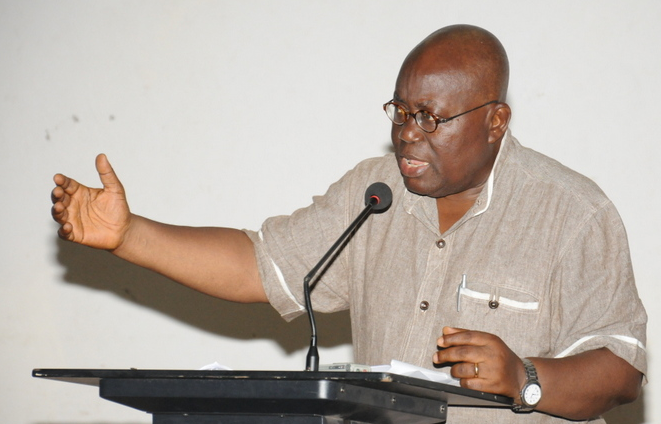The 2016 presidential candidate of the New Patriotic Party, Nana Addo Dankwa Akufo-Addo, has described the bribery scandal that has rocked Ghana’s judiciary as “a sad and worrying time” for all advocates of the rule of law in Ghana.
The shock and sadness many Ghanaians feel at the revelations, according to the NPP flagbearer, stems from the fact that most Ghanaians have “an unshakeable belief that the law is the guarantor and protector of our rights as citizens”
[contextly_sidebar id=”qLI0LcxeQ6bdKZrrgEF8Y4nEub2ykjsE”]He further stated that “corruption at any level of the judicial process undermines the confidence of the people.”
Nana Akufo-Addo, a one-time Attorney-General and a lawyer of many years experience, made this known when he addressed the maiden edition of Legal Luminaries Platform of the Law Students’ Union of the Faculty of Law of the University of Cape Coast on Friday, September 25, on the topic “40 Years Of Working With The Law; Can The Law Save The People?”
The damning revelations from the investigations carried out by Anas Aremeyaw Anas, according to Akufo-Addo, “has demonstrated in the most dramatic and graphic manner what many have suspected for a long time, that some of our judicial officials can be persuaded to compromise the delivery of justice in the courts.”
On the judicial inquiry and impeachment processes being undertaken by the Chief Justice he noted that “it is imperative, however, that due process be strictly observed.”
This, he said, is because of the delicate position judges hold in the administration of justice, adding that “there should be due process not only to safeguard or satisfy the rights of the judges involved, but also to ensure that wrongdoers are punished and no one, however elevated in society, is seen to be above the law. That is the meaning of equality before the law, that we are all subject to law and nobody should be seen to be above the law.”
He continued, “I must say that it is a sad and worrying time for all of us who have spent our lives promoting the rule of law and I believe it is imperative on us to be careful to handle things in a manner that will keep the dignity of our institutions and restore confidence in the judicial process.”
The Ghanaian people, Nana Akufo-Addo said, require that the administration of justice be free from corruption and also be effective, protecting either their rights against each other, or their rights against the state.
To the law students, he urged them to embrace the key value of honesty, citing the example of his own legal career, where none of the cases he worked on had verdicts procured through corruption.
“None of the cases I did were as the result of seeing a judge in chambers. It is important that people at the bar continue to uphold those principles, that at the end of the day, you get judgement based on the cogency of your argument, the skill of your advocate, his or her knowledge of the law and presentation and not because you go to see a judge in chambers, to pervert and subvert justice,” he concluded.
–
Below is the full excerpt of Nana Akufo-Addo’s remarks on Anas’ exposé
We are right in the midst of one of the greatest challenges that our governance system has faced with the dramatic expose of corruption in our judiciary. The judiciary administers justice. And that is the cornerstone of our democracy. Anas Aremeyaw Anas, the enterprising investigative reporter, has demonstrated in the most dramatic and graphic manner what many have always suspected for a long time, that some of our judicial officials can be persuaded to compromise the delivery of justice in the courts. The shock that we all feel and the sadness that we feel come from our unshakeable belief that the law is the guarantor and protector of our rights as citizens and corruption at any level of the judicial process undermines the confidence of the people. In dealing with this grave situation, it is imperative, however, that due process be strictly observed. Precisely because of their delicate position in the administration of justice, there should be due process not only to safeguard or satisfy the rights of the judges involved, but also to ensure that wrongdoers are punished and no one, however elevated in society, is seen to be above the law. That is the meaning of equality before the law, that we are all subject to law and nobody should be seen to be above the law. I must say that it is a sad and worrying time for all of us who have spent our lives promoting the rule of law and I believe it is imperative on us to be careful to handle things in a manner that will keep the dignity of our institutions and restore confidence in the judicial process. The Ghanaian people require that the administration of justice be free from corruption and also be effective, protecting either their rights against each other, or their rights against the state.
–
Source: Office of Nana Akufo Addo


